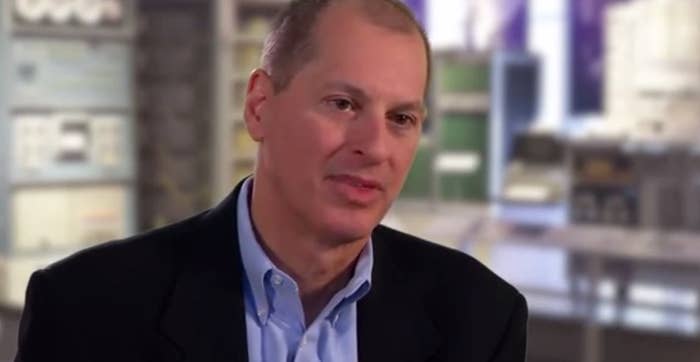
The Consumer Technology Association is a venerable, 92-year-old trade group that puts on the Consumer Electronics Show, the annual product extravaganza in Los Vegas that draws hundreds of thousands of attendees. The association of more than 2,200 corporations — and its president and CEO, Gary Shapiro — tends to give money to the traditional American party of big business, as you might expect.
Yet this summer, as then-Republican presidential nominee Donald Trump blasted tech-friendly trade deals like the TPP on the campaign trail, the CTA switched gears. Shapiro – who described Trump as "unqualified" — and his organization enjoyed a months-long flirtation with the Democratic Party and its nominee, Hillary Clinton.
But in the weeks since the election, Shapiro and others within the CTA have now twisted like a pretzel, publicly and repeatedly expressing optimism about the coming Trump administration — even if no one yet knows what his tech policies will look like, or how they'll shape the industry, other than to shake it up.
"We are in the innovation world," Shapiro told Buzzfeed News. "We adapt to change. That’s what we do. We’re tech ninjas. That means things change and you adapt."
But there's adapting, and there's adapting as quickly as the CTA has: The organization sent out a congratulations to Trump before Clinton had even given her concession speech. That may be keeping a finger to the wind, or it may, according to Berin Szoka, president of the libertarian think tank TechFreedom, be a sign that the organization feels it is obligated to help mold Trump's inchoate tech platform.
"From their perspective, there's no adult supervision," Szoka said. "They're trying to play that role. They want to be at the table, and they're terrified of what would happen if this were left up to a strong anti-Silicon Valley contingent in the new administration."
Whatever the reason, for Shapiro and the CTA, it's been a quick journey from a Republican to a Democrat and back again. Over the years, Shapiro has donated to mainstream Republicans such as Paul Ryan, Darrell Issa, and Roy Blunt. And the CTA's political action committee, to which Shapiro has given some $50,000, financially supported John McCain in 2008, Mitt Romney in 2012, and Marco Rubio in the Republican primary in 2016.
"We’re tech ninjas. That means things change and you adapt."
But then something weird happened: Donald Trump broke with decades of business-friendly orthodoxy from the GOP and crushed the Republican primary field. Along the way, he antagonized the tech industry and promised to gut pro-business global trade agreements.
"People are worried on trade," Shapiro said.
So Shapiro — and his organization — who had publicly supported Rubio, and were eager to preserve international trade deals with the Asian countries where most tech hardware is manufactured, found themselves in a strange position: With Her.
And also, very, very much against him.
Over the summer, Shapiro wrote a series of columns decrying Trump's protectionist rhetoric on trade, praising Hillary Clinton's tech policies, and fantasizing about a Clinton-Mitt Romney ticket that "Could Guarantee a Clinton Win." In a Reddit AMA, Shapiro described Trump as "unqualified."

And two weeks before the election, Shapiro wrote a column in US News & World Report that concluded "Trump simply doesn't understand the modern economy."
Then election day came and Trump won. And like a host of anti-Trump Republicans who vowed never to do business with the president-elect, Shapiro did not exactly reiterate his opposition with force. Instead, his strong anti-Trump stance seems to have lasted only a few hours after the results came in.
On the morning after the election the CTA sent out a press release congratulating Trump on his victory, and citing the Republican majority in the Senate as "an opportunity . . . to rollback unnecessary rules, tackle high-skilled immigration reform, reduce patent troll extortion, lower corporate taxes and reduce spending."
Later the same day, Shapiro wrote a column for Fortune entitled "How Donald Trump Can Heal A Divided America Now," in which he highlights Trump's "willingness to achieve goals through deals," and suggests ways that Trump could modify the Trans-Pacific Partnership rather than abandoning it entirely.
A week after the election, the CTA put out another release, touting Trump's "Unique Opportunity to Advance IoT."
And Tuesday, three weeks after the election, Shapiro wrote a column for Fox News outlining "Four reasons why our economy will thrive under President Trump." While conceding that he voted for Clinton, Shapiro recommended that Americans "follow the lead of the initially jumpy financial markets and shift from doom and gloom to optimism." Shapiro nodded to the possibility of Trump raising trade tariffs on China or withdrawing from NAFTA, but concluded that "the stock market can and will be the real-time measure of his economic success."
Last week, the CTA's Senior VP for Government Affairs Michael Petricone, speaking on Tech Freedom's policy podcast, said that "The mantra of our industry is that change is good. We're going to set an example here with CTA and the tech industry and move forward and find common ground with a new administration." Petricone went on to frame Trump's lack of a tech policy platform as a major opportunity for the industry.
Funding for the CTA comes principally from CES; that has liberated them, Szoka said, from relying on their members for financial support, like other trade groups. "Their interests sync up quite well with American consumers," Szoka said. "They want a healthy, functional tech sector. That may explain why they are quicker to move. It's an opportunity to steer things in a good direction."
Asked whether he still thinks Trump is unqualified to be President, Shapiro told BuzzFeed News "the American people have decided he’s qualified. What I think doesn’t matter."
